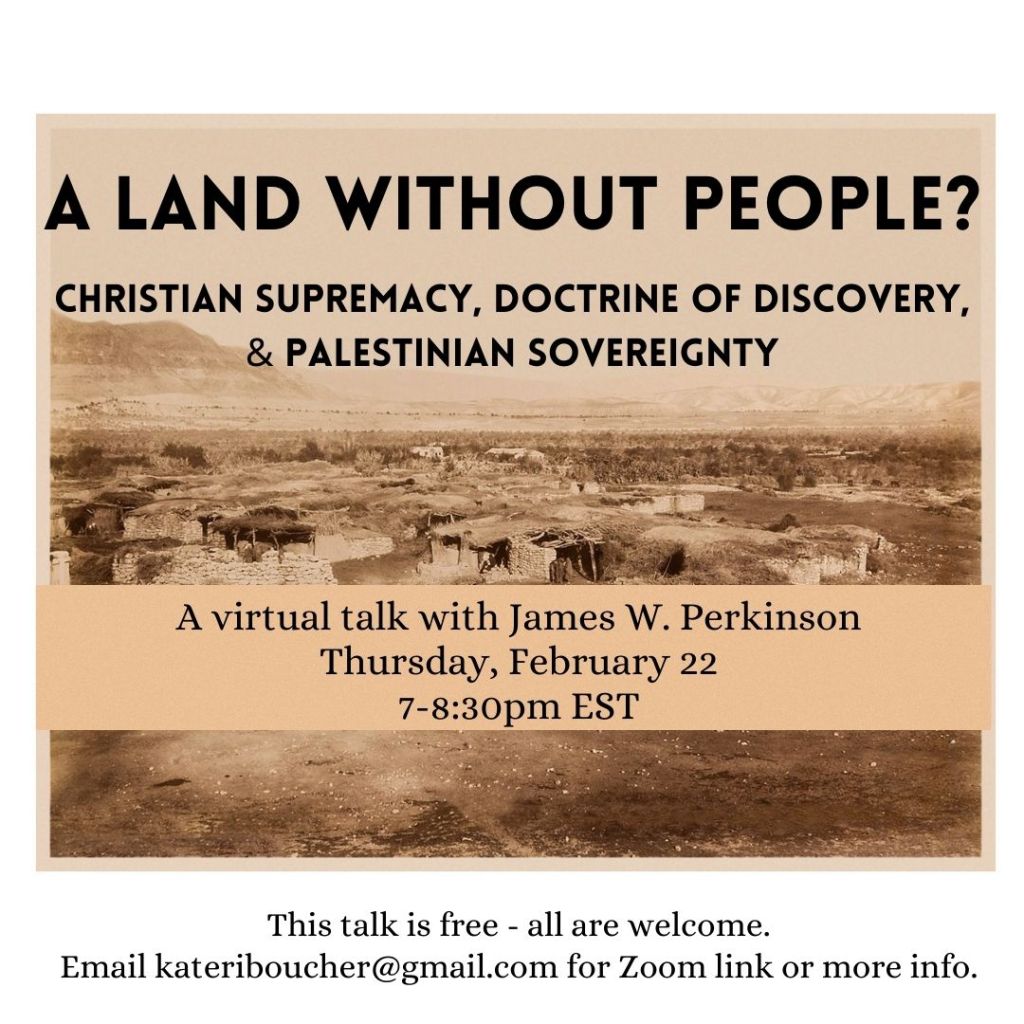
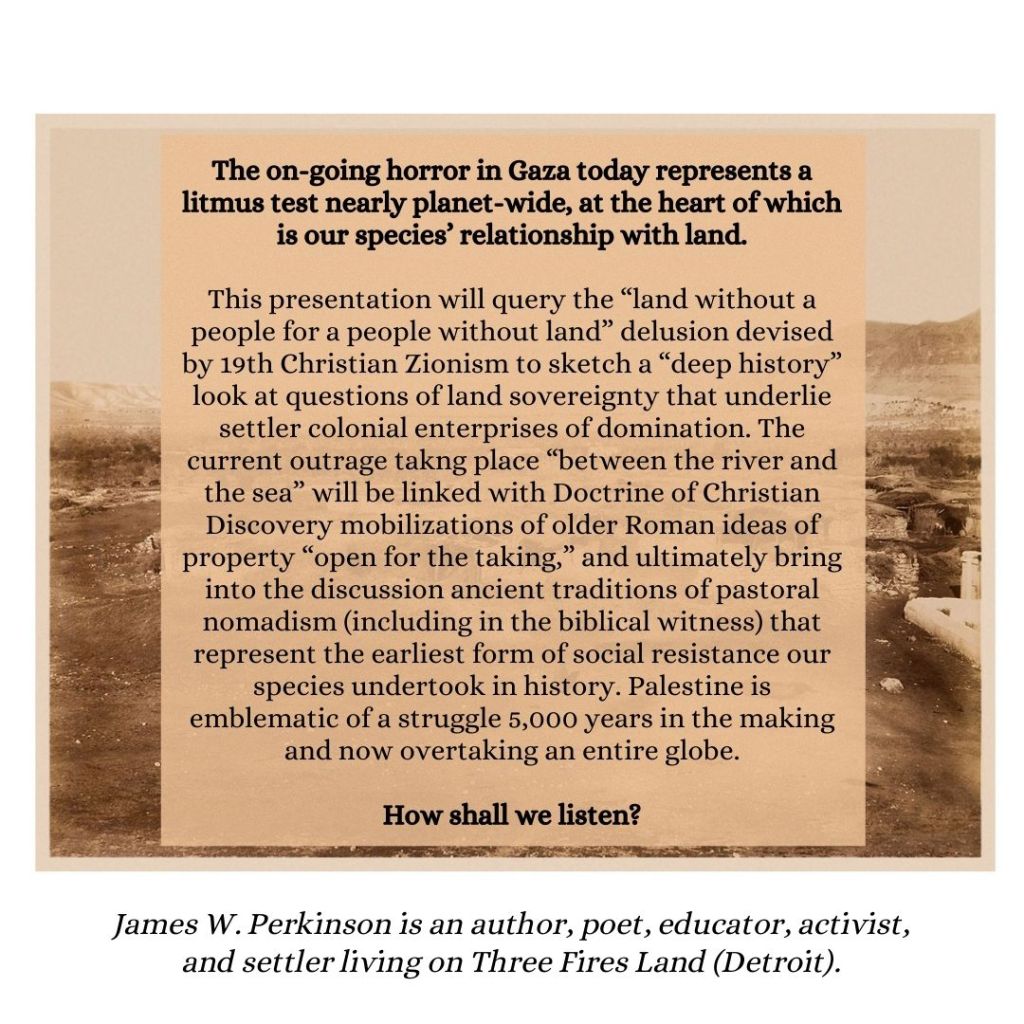


By Jim Perkinson, a sermon for St. Peter’s Episcopal Church (October 1, 2023), a
So, land. A big topic. My wife was recently asked to open a Michigan Climate Summit Conference hosted at Oakland University where she teaches with a formal land acknowledgement and after giving greetings in her native tongue of Kapampangan from the Philippines, the traditional homeland of the Ayta, she offered the following:
I’ve been asked to do the Land Acknowledgment to set the tone for our gathering today and it is fitting that I do so because I, too, am a settler here on Turtle Island. As one Mohawk scholar once said to me once, “It doesn’t matter if your people were brought here through historic colonization, as far as Native peoples are concerned, you are still settlers.” Something I’ve had to sit with for a long time and ponder.
And as protocol goes, it is settlers like myself—not Native peoples—who must acknowledge whose land we’re on—that we are here on Native peoples’ stolen land. And we name this truth not just as pro forma, but as part of the discipline of facing into—and beginning to unlearn—our settler privilege—recognizing that our presence here on this land as non-indigenous peoples means we are beneficiaries not only of native genocide and dispossession, but of other kinds of historic oppressions such as African slavery, U.S. imperialism abroad, and the ecocidal clearing of forests and decimation of wildlife habitat in order to build our cities that’s part of what is driving climate change.
Continue reading “The Biggest Mouth in the World: A Riff on Genesis 4:8-16”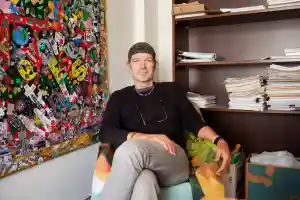
By Jim Perkinson, a homily for St. Peter’s Episcopal Church, Detroit, MI (May 28, 2023)
So, Pentecost! We will begin deep in the weeds. Literally. “Pente-cost”—in Greek, the 50th day! But 50th day after what? After Passover. But why 50? Well, 49 + 1. Huh? We scratch our heads. But of course, the early Christians, though working in the language of the Greeks—pentekoste—are translating practice and memory of the Hebrews. So hard this biblical faithfulness business—plunges us straight into serious cross-cultural labors and mistakes. Such a big history of mistakes! More on that later. But the Hebrews! They didn’t call it Pentecost, but Shavuot, the Feast of Weeks. 7 weeks after Passover, but with the counting starting on the 2nd day of Passover—so 49 + 1.
Ok—but then, what anchors Passover, when does it begin? Ah, now we’re getting down to it, yes, getting down, “gettin’ down,” heavy on the down beat! But what is down? What direction? There—pointing to your feet? Yes, but what is down there? A tile floor, you say? And under that? Wood floor joists? And under that? Pipes? Yes, yes, and a basement and then cement. And, and . . . But finally, even in the city, we get to it. Earth. What all of life stands on and grows in. The big assumption. The Big Momma we take for granted again and again!
Continue reading ““As a Mighty Wind”: Or, Which Pentecost?”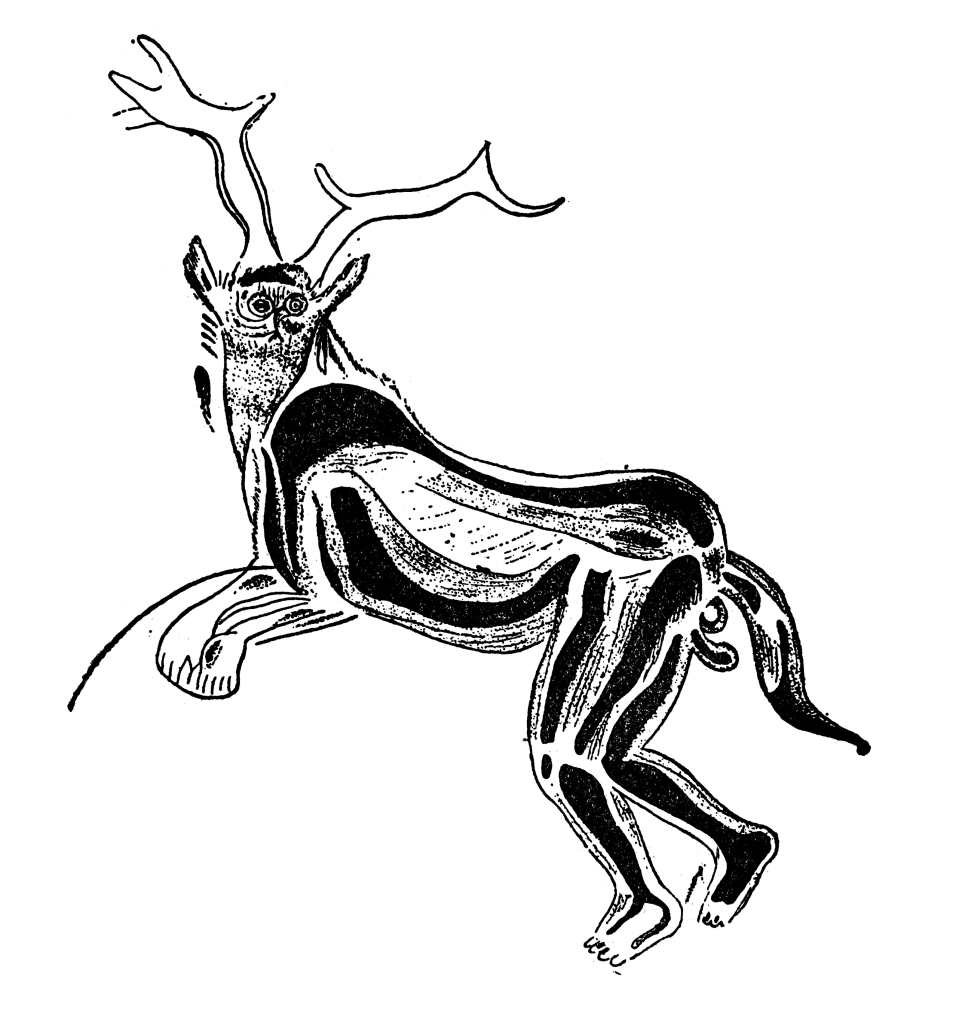
By Jim Perkinson, a Palm Sunday sermon for St. Peter’s Episcopal Church in Detroit, MI (04.02.2023)
And when they drew near to Jerusalem and came to Beth′phage, to the Mount of Olives, then Jesus sent two disciples, 2 saying to them, “Go into the village opposite you, and immediately you will find an ass tied, and a colt with her; untie them and bring them to me. 3 If any one says anything to you, you shall say, ‘The Lord has need of them,’ and he will send them immediately.” 4 This took place to fulfil what was spoken by the prophet, saying,
5 “Tell the daughter of Zion,
Behold, your king is coming to you,
humble, and mounted on an ass,
and on a colt, the foal of an ass.”
6 The disciples went and did as Jesus had directed them; 7 they brought the ass and the colt, and put their garments on them, and he sat thereon. 8 Most of the crowd spread their garments on the road, and others cut branches from the trees and spread them on the road. 9 And the crowds that went before him and that followed him shouted, “Hosanna to the Son of David! Blessed is he who comes in the name of the Lord! Hosanna in the highest!” 10 And when he entered Jerusalem, all the city was stirred, saying, “Who is this?” 11 And the crowds said, “This is the prophet Jesus from Nazareth of Galilee.”
So, begins the most profound communication in the public career of Jesus of Nazareth. At the apex of his popularity, bringing his own movement “posse” from their home turf in the outback of Galilee to the central city in Occupied Palestine for an ultimate showdown in the Temple-State shrine, he confesses “lack.” He “needs.” And what he needs is a burro. Or ass. Or donkey—they are all words for the same animal (but not a mule, as we shall see, and not a horse).
Continue reading “The Donkey-Human Rides Again”By Jim Perkinson, a sermon for St. Peter’s Episcopal Church in Detroit, Michigan (March 5, 2023)
Last week Carvan asked me “What’re you gonna preach on!” I said something like, “I don’t know yet—we’ll see.” Only partially truthful—but human “knowing” is always a work in progress and for a 71-year old man, more like a bird flitting “now here, now gone,” than a rock sitting hard and fast on the ground. But the response was also a way of keeping the door open, letting the wind in, as the gospel today retorts, making womb-space for new seeds to plant themselves and grow. And sure enough, a new seed showed its face on the very morning of my beginning to sprout whatever it was I was going to say. And contrary to our modern dried up relations with the plant world, seeds do have faces. So, I will start there.
The New York Times this past Friday had a feature on the most recent museum display of Wangechi Mutu, Kenya artist straddling the Atlantic like her people have been made to do for 500 years now, crafting pain into vision, trauma into beauty, haunting and clairvoyant. She sees the past and future all in one glimpse. And opens the sight for any who would dare look. But only, as John enjoins, if you are willing to be “born again.” Am I? Are you? Hmmmm . . .
Continue reading “Entering the Womb Again: A Sermon for Straight Males (and Everyone Else)”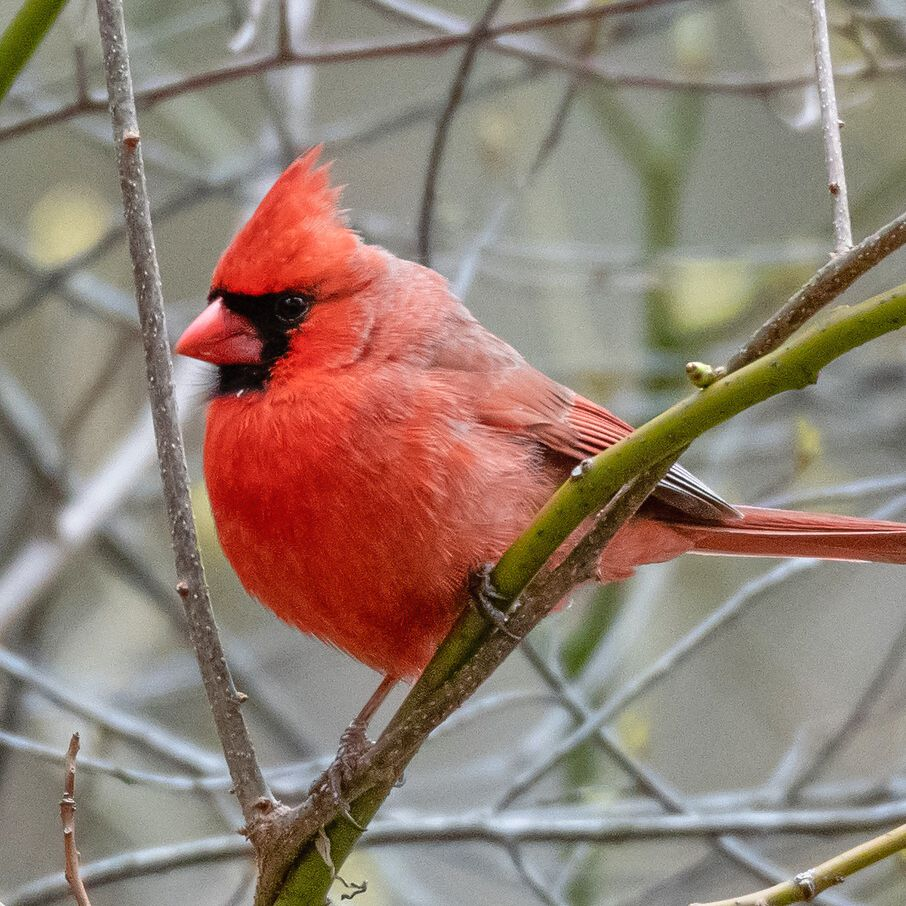
By Jim Perkinson, a sermon for St. Peter’s Episcopal, a riff on Luke 12:22-31 for “Animal Sunday” in the Season of Creation Readings: Year C
I woke up this morning an old man—an experience recurrent over recent months here at the far end of pandemic shifts in life and schedule and interaction. I have not the energy I had before my classrooms miniaturized from a 20 by 30 ft space of animated bodies to a 12 by 15 inch screen flattened into pixelated colors and shapes. I cannot strut and gesture, advance and retreat with my ideas taking on flesh and then resounding, reverberating, up-thrusting like rock or quieting like mist in the rhythmic back and forth of in-person engagement. My body is bereft and grieving. And that grief is but a minute fragment of what ghosts my bones now, as I become ever more aware of what I have lost—not just in recent years, but recent centuries and indeed millennia, that yet echo as traces and sighs, unspoken and unspeakable in my veins and hair, my nose and ear—ancestors that whisper and pulse and haunt, whose own grief and jubilation has no anatomical muscle adequate to its tones and cadence.
Continue reading “Between Red Bird Songs and Brown Squirrel “Skalds”: Learning from the Poetry Outside My Door”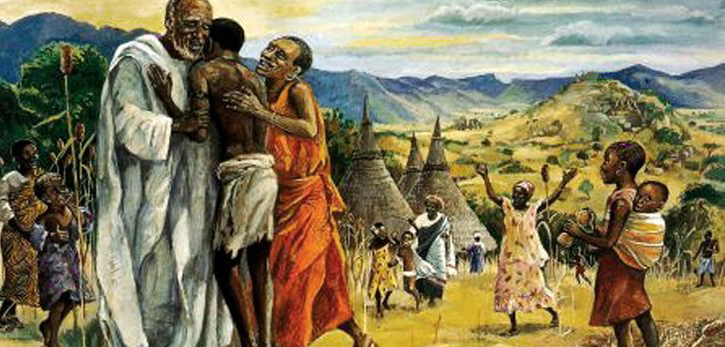
By Jim Perkinson
One of the effects of the irruption of Global South thought into Global North theology in the last half century is a re-reading of the bible from within the experience of poverty. Not least among the new insights occasioned by this re-reading is that concerning the parables. Scholars like Walter Wink and William Herzog and popular cultural educators like Ched Myers have made us aware that such folk stories, read in social context rather than spiritualized and universalized, have the character of political cartoons. Rather than allegories offering us characterizations of God or Jesus, they are better understood as politically-coded riddles, inviting their hearers to judge for themselves the situations they find themselves in. In 1st century Palestine among an oppressed people, they often served a function of consciousness-raising, provoking peasant listeners to dare risk thinking and voicing their own interpretation of events and discover their own wisdom. Only indirectly and obliquely do the parables speak about God, and then only by way of unmasking domination and uncovering the cry of anguish it silences. The results of such a contextual reading can be startling.
Continue reading “Prodigal Prodigality Versus Village Party: On Not Killing the Fatted Calf”Join the last session with Dr. James Perkinson tonight on Zoom from 7pmEDT! See this to review the first session for a little background. See below for Zoom Link.
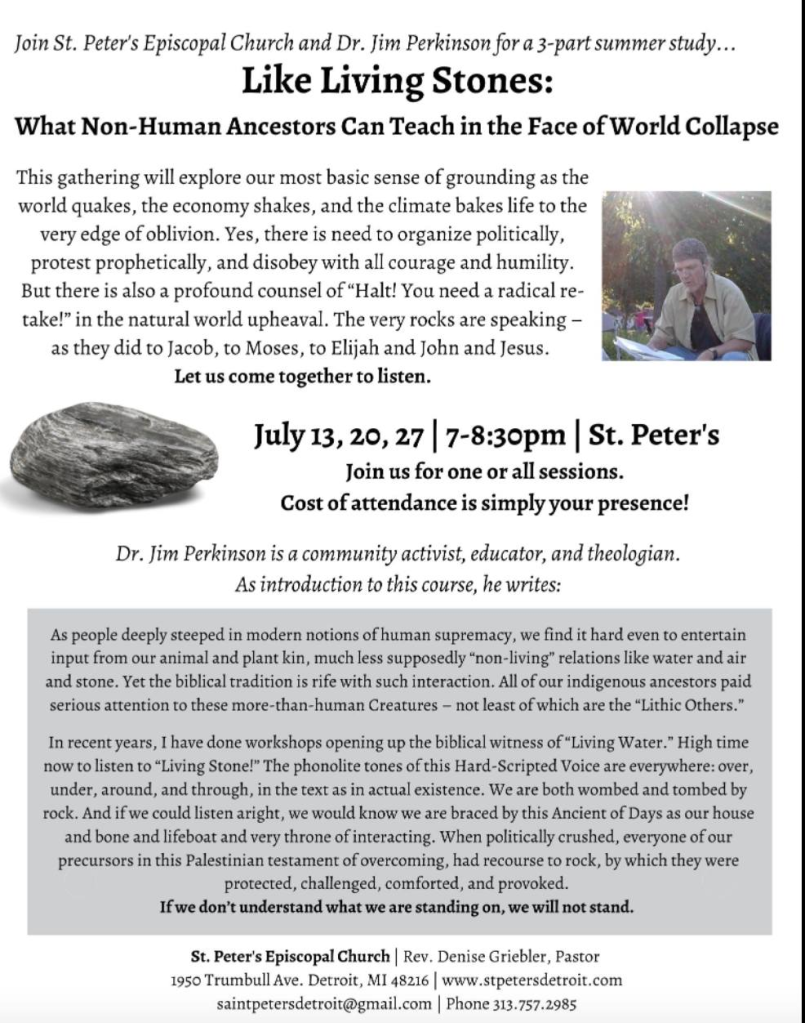
| https://us06web.zoom.us/j/89197035463 Meeting ID: 891 9703 5463 One tap mobile +13126266799,,89197035463# US (Chicago) +16469313860,,89197035463# US |
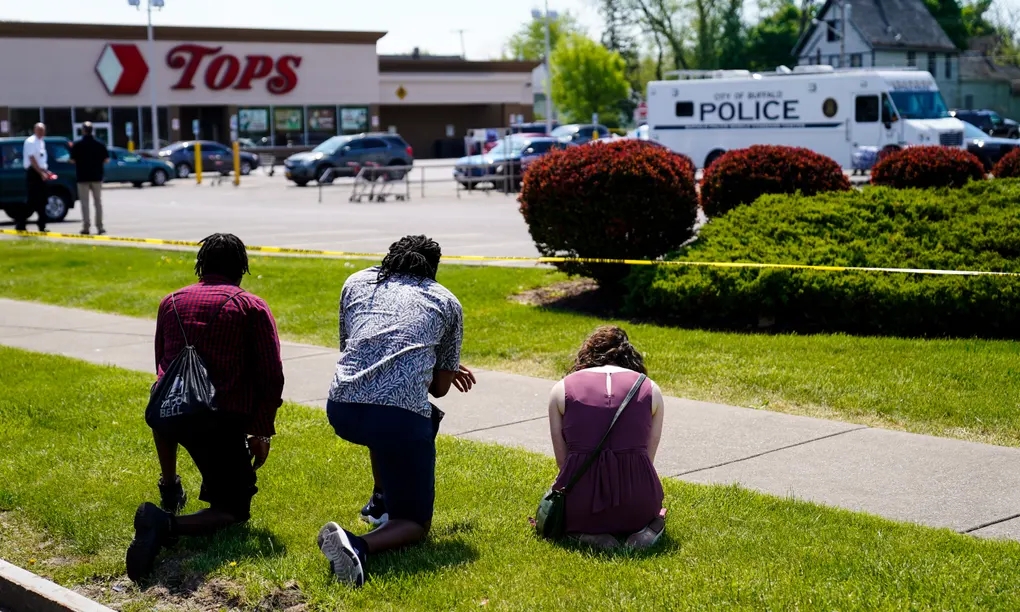
By Jim Perkinson, on Revelation 21:1-6
“i saw a new heaven and earth”
13 shot in the buffalo market
for the first heaven and the first earth
had passed away
11 black, 2 white
and the sea was no more
10 dead
and i saw the holy city
and the perp showed up in the lot
For over 20 years, Jim Perkinson has been riffing on lectionary selections in spoken word mode and often presenting the same at worship services of St. Peter’s Episcopal Church just outside downtown Detroit. This is the third in a series of collaborations between Jim and Tim Nafziger putting this poetry in video form with text below.
jim perkinson
4-12-20
empty churches preaching empty tombs
to empty pews, a vision of gloom,
the doom of the poor now creeping close
in corona-spoor knocking even at the door
of the rich and who would have thought
it all could upend in a single dash of air-splash, invisible, carrying not quite living code
from animal to our abode everywhere,
leading all but rash, bible-brash evangelical hubris
to hunker in shelter, or fear-trembled,
in hovels or dense-packed streets
of homeless retreats or refugee tents
a world of babel towers and fake news showers
and glowering, bulge-veined purveyors of cover
for the bankers and oil exec wankers to push profit-margins to the edge of the cliff . . .